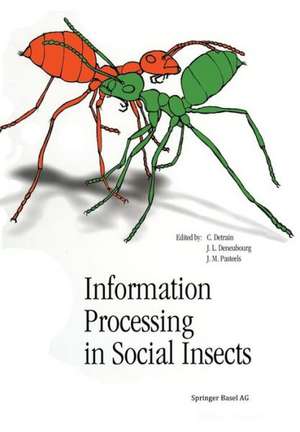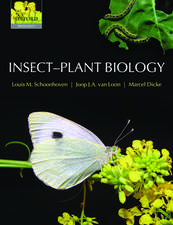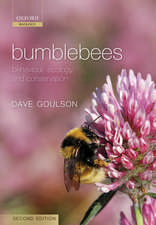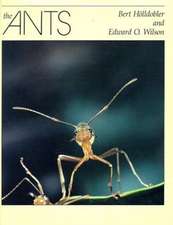Information Processing in Social Insects
Editat de Claire Detrain, Jean L. Deneubourg, Jacques M. Pasteelsen Limba Engleză Paperback – 17 oct 2012
Preț: 650.04 lei
Preț vechi: 764.76 lei
-15% Nou
Puncte Express: 975
Preț estimativ în valută:
124.39€ • 130.47$ • 103.55£
124.39€ • 130.47$ • 103.55£
Carte tipărită la comandă
Livrare economică 01-15 aprilie
Preluare comenzi: 021 569.72.76
Specificații
ISBN-13: 9783034897518
ISBN-10: 3034897510
Pagini: 432
Ilustrații: XIV, 415 p.
Dimensiuni: 170 x 244 x 23 mm
Greutate: 0.69 kg
Ediția:Softcover reprint of the original 1st ed. 1999
Editura: Birkhäuser Basel
Colecția Birkhäuser
Locul publicării:Basel, Switzerland
ISBN-10: 3034897510
Pagini: 432
Ilustrații: XIV, 415 p.
Dimensiuni: 170 x 244 x 23 mm
Greutate: 0.69 kg
Ediția:Softcover reprint of the original 1st ed. 1999
Editura: Birkhäuser Basel
Colecția Birkhäuser
Locul publicării:Basel, Switzerland
Public țintă
ResearchCuprins
1 Group size and information flow inside the colony.- Group size, productivity, and information flow in social wasps.- Task partitioning in foraging: general principles, efficiency and information reliability of queueing delays.- Interaction patterns and task allocation in ant colonies.- Information flow during social feeding in ant societies.- Models of information flow in ant foraging: the benefits of both attractive and repulsive signals.- Information flow in the social domain: how individuals decide what to do next.- 2 Role and control of behavioral thresholds.- Response thresholds and division of labor in insect colonies.- Role and variability of response thresholds in the regulation of division of labor in insect societies.- Social control of division of labor in honey bee colonies.- Genetic, developmental and environmental determinants of honey bee foraging behavior.- Behavioral threshold variability: costs and benefits in insect societies.- 3 The individual at the core of information management.- Individuality and colonial identity in ants: the emergence of the social representation concept.- Key individuals and the organisation of labor in ants.- Temporal information in social insects.- The individual at the core of information management.- 4 Amplification of information and emergence of collective patterns.- Activity cycles in ant colonies: worker interactions and decentralized control.- The mechanisms and rules of coordinated building in social insects.- Decision-making in foraging by social insects.- The mystery of swarming honeybees: from individual behaviors to collective decisions.- Collective behavior in social caterpillars.- Self-organization or individual complexity: a false dilemma or a true complementarity?.













